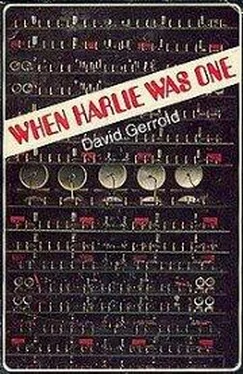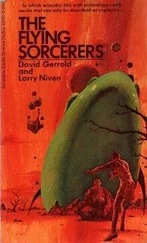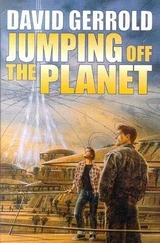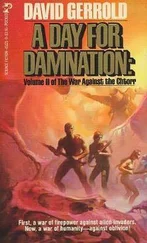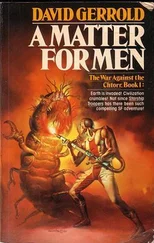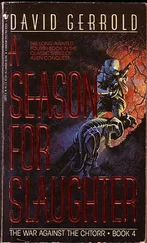David Gerrold - When HARLIE Was One
Здесь есть возможность читать онлайн «David Gerrold - When HARLIE Was One» весь текст электронной книги совершенно бесплатно (целиком полную версию без сокращений). В некоторых случаях можно слушать аудио, скачать через торрент в формате fb2 и присутствует краткое содержание. Год выпуска: 1972, ISBN: 1972, Издательство: Doubleday, Жанр: Фантастика и фэнтези, на английском языке. Описание произведения, (предисловие) а так же отзывы посетителей доступны на портале библиотеки ЛибКат.
- Название:When HARLIE Was One
- Автор:
- Издательство:Doubleday
- Жанр:
- Год:1972
- ISBN:978-0345028853
- Рейтинг книги:3 / 5. Голосов: 1
-
Избранное:Добавить в избранное
- Отзывы:
-
Ваша оценка:
- 60
- 1
- 2
- 3
- 4
- 5
When HARLIE Was One: краткое содержание, описание и аннотация
Предлагаем к чтению аннотацию, описание, краткое содержание или предисловие (зависит от того, что написал сам автор книги «When HARLIE Was One»). Если вы не нашли необходимую информацию о книге — напишите в комментариях, мы постараемся отыскать её.
Nominated for Nebula Award for Best Novel in 1972.
Nominated for Hugo Award for Best Novel in 1973.
When HARLIE Was One — читать онлайн бесплатно полную книгу (весь текст) целиком
Ниже представлен текст книги, разбитый по страницам. Система сохранения места последней прочитанной страницы, позволяет с удобством читать онлайн бесплатно книгу «When HARLIE Was One», без необходимости каждый раз заново искать на чём Вы остановились. Поставьте закладку, и сможете в любой момент перейти на страницу, на которой закончили чтение.
Интервал:
Закладка:
“You’re afraid people will talk?”
He shrugged again. “I don’t know. They are already, I guess.” He frowned at a momentary lumpiness in the stream of traffic.
As he maneuvered through it, she turned over in her mind possible things to say. “ Ashamed to be seen with me? ” — No, that wasn’t right. “We have nothing to hide —” No, not that either. “Do we have something to hide —?” At last she decided to say nothing. It was just as well — the moment was long past.
They were gliding across the rooftops of cluttered suburbia — black roofs and red, two-car garages and stationwagons out in front — green-pea lawns and a cacophony of architectural voices. Early-American-Al-most-Slum next door to Ancient-Gingerbread-With-Original-Icing, followed by Plastic-Cracker-Box and Flag-stone-Walking-Pseudo-Caüfornian. Ugly stucco boxes; white walls stained with brown streaks and greasy smoke from kitchen windows; rust-outlined screens on brown faded apartment buildings.
From their vantage above they could see housewives in green shorts hanging damp sheets on wire lines, and blue-gray mailmen with heavy brown bags, white-filled with envelopes. Children, too small to be in school, chased after dogs bigger than they were and too smart to be caught Collies and poodles and black-and-brown mutts…
… were replaced by shopping centers, elegant plastic arches and pseudo-gaudy frills — great glass windows, bright-lit and full of wishes and temptations. Then more houses, more shopping centers, neon-glaring, harsher and shriller — then taller buildings, stucco-sided offices and torn-paper-flapping billboards — and warehouses, big and featureless and ugly — more office buildings, this time concrete and glass-sided slabs — and then even taller buildings. They slid down an off ramp between two of the biggest, a narrow canyon with sunglaring walls. Down into the rough, potted street — it hadn’t been resurfaced in years.
Abruptly, Auberson realized where he was heading — the Red Room, the restaurant where they had gone on their first date. Now why did I do that? It was too late to change his mind, though — he swung around a corner and they were there.
They didn’t get the same booth, though, so at least he was spared that uncomfortable parallel. Uncomfortable? Why should it be uncomfortable?
She didn’t mention the choice of restaurant; instead she seemed to accept it as an inevitable spot for the two of them. After they had ordered, she looked at him sharply. Her green eyes were deep. “What’s the matter?” she asked.
“Huh? What do you mean?”
“Nothing, I guess. I just say that sometimes.”
“Oh.” He said it like he understood, but he didn’t.
She decided to talk about something else. “I hear you’ve been having trouble with HARLIE again.”
“With HARLIE? No, not with HARLIE — because of HARLIE.”
“Well, you know what I mean. The whole company is in an uproar. Something about some unauthorized specs — 1 haven’t had a chance to pay too much attention to it. I’ve been troubleshooting the annual report for Dome.”
“Oh? I thought it was finished already.”
“Well, it was supposed to be — but the statistics keep coming out wrong. Er, that is, they keep coming out right.”
“Huh?”
“Well—” She hesitated, then made a decision. “I guess it wouldn’t hurt to tell you. The company has two sets of books, you know.”
“Huh?” Now he was even more confused.
“Oh, it’s nothing illegal,” she hastened to explain. “One set is the real books, the other is for public consumption — the stockholders mainly.”
“That sounds illegal to me.”
She made a face. “It is and it isn’t. Let’s just say the second set of books is more — cosmetic. It looks prettier. The figures haven’t been falsified so much as they’ve been — rearranged. Like, for instance, HARLIE.”
“HARLIE?”
“Yes, HARLIE. You know and I know that he’s a research operation — but some of the Directors think his cost is too large a sum to be listed entirely under Research. Don’t look at me like that, David — I don’t make policy and I don’t know why this policy was made in the first place. Apparently they feel it wouldn’t look good to the stockholders to see that much money being plowed back into the business—”
“Elzer. Carl Elzer,” said Auberson.
“And others,” Annie conceded.
Aubie’s mind was working. “I know what it is,” he said. “They’re looters.”
“Huh?”
“You remember how they took over the company?”
“Wasn’t it some kind of stock mix-up? I remember there was a lot of talk about it, but I didn’t pay that much attention.”
“Neither did I, damnit.” He searched his memory. “I know there were a lot of hard feelings about it. I know a couple people quit; a couple others were fired. Elzer and Dome and some of the other Directors are part of a financial syndicate. They specialize in taking over companies. They loot them for their cash assets and use that money to buy other companies.” He snapped his fingers. “That’s it — they must have taken it away from the holding company.”
“You’re starting to lose me,” she said.
“I’m not sure I follow it all myself.” One thought tumbled out after another. “Look, Stellar-American Technology and Research set up four other companies to handle various aspects of hyper-state electronics. We’re one of them. Stellar-American owns 51 percent of each — but Stellar-American is owned by a holding company itself. Get control of that holding company and you’ve got five companies in your pocket — six, counting the holding.”
“But, how—”
“I can think of a couple ways. In order to exploit the hyper-state process, they probably had to go heavily into debt. Let’s say they were betting on a four percent return on their investment in order to pay back the loans; the process proves harder to develop than they thought, and expected profits don’t materialize; they lose money, they borrow more, they go deeper into debt, all the time betting that they’ll be able to make it back because the market is entering an inflationary spiral. This is all guesswork on my part, but suppose the company was pushed to the point where they’d be willing to put up shares of stock as collateral for a new loan. If Dome and Elzer made the loan — or one of their companies — they could take over the stock when the debtor found himself unable to pay back the funds. In this case, they get the holding company.”
“Yes, but David — no company is going to risk a controlling amount of its stock.”
“No,” he agreed. “But they might risk enough to cut their share of it down — that is, if they were sure the other major stockholders wouldn’t doublecross them.”
“Ugh.” She made a face. “Wait a minute — you may be right. I think only 36 percent of Stellar-American Technology ever reached the open market.”
“How do you know that?”
“It was in a report I had to process. In order to get the original rights to produce hyper-state units, they had to trade a certain number of shares to the man who owns the patents.”
“Krofft? Dr. Krofft?”
“I don’t know — if that’s his name, then he’s the one. Anyway, I know for a fact that the inventor owns something like 24 percent of Stellar-American voting stock. He’s a company all by himself — Stellar-American had to trade the stock for exclusive rights to the process.”
Auberson whistled. “That Krofft—” He began thinking out loud. “Let’s see, the holding company owns 51 percent of Stellar-American. They could take out a loan on a 24-percent piece, and figure that Krofft will stick with them so they would still control 51 percent.”
Читать дальшеИнтервал:
Закладка:
Похожие книги на «When HARLIE Was One»
Представляем Вашему вниманию похожие книги на «When HARLIE Was One» списком для выбора. Мы отобрали схожую по названию и смыслу литературу в надежде предоставить читателям больше вариантов отыскать новые, интересные, ещё непрочитанные произведения.
Обсуждение, отзывы о книге «When HARLIE Was One» и просто собственные мнения читателей. Оставьте ваши комментарии, напишите, что Вы думаете о произведении, его смысле или главных героях. Укажите что конкретно понравилось, а что нет, и почему Вы так считаете.
